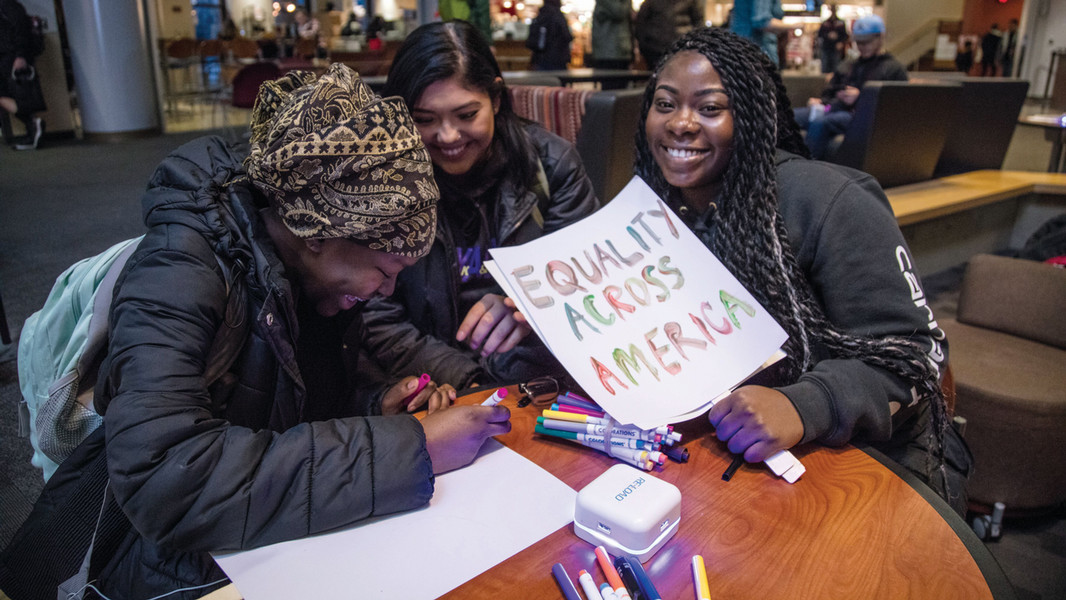
Diversity and Equity Center
Interfaith Calendar
This calendar provides a reference point for celebrations, holidays or spiritual engagements that CWU community members may observe during the academic year. The calendar utilizes the most commonly observed religious. The list provided below is not exhaustive, strives to include as many secular observances, and is intended to be a guide that fosters additional research and reflection. The Diversity and Equity Center welcomes additions and edits by emailing diversity@cwu.edu.
Students, did you know that you can request reasonable accommodations if an academic responsibility coincides with a religious observance? Senate Bill 5166 states that students must provide faculty written notice within the first two weeks of the quarter with dates noting the request for accommodation.
January
This diversity calendar starts with month-long celebrations in January:
Poverty in America Awareness Month
Slavery and Human Trafficking Awareness Month
January 1: New Year’s Day, the first day of the year as celebrated by many countries.
January 6: The Feast of the Epiphany, also known as Three Kings Day or Día de los Reyes, a Christian holiday that recognizes the visit of the three wise men to the baby Jesus after his birth.
January 7: Christmas Day, as celebrated by Eastern Orthodox Christians, as they follow the Julian calendar instead of the Gregorian calendar.
January 8: Bodhi Day, the Buddhist holiday that commemorates the day that Siddhartha Gautama experienced enlightenment.
January 14: Orthodox New Year, according to the Julian calendar.
January 17: World Religion Day, a Bahá’í holiday that celebrates the commonality between different religions and encourages interfaith understanding.
January 18: Martin Luther King Jr. Day, a holiday that marks the birthday of civil rights leader Martin Luther King, Jr.
January 27-28: Tu B’shevat, or the Jewish New Year for Trees, known as the Jewish Arbor Day, which marks the start of spring in Israel.
January 28: Mahayana New Year, the day that Mahayana Buddhists celebrate the new year.
February
February is
Black History Month, celebrating the history and achievements of Black Americans.
February 1: National Freedom Day, honoring the signing by Abraham Lincoln of a resolution that later became the 13th Amendment to the U.S. Constitution that abolished slavery.
February 2: Candlemas, a Christian holy day that commemorates when Jesus was presented to the temple for the first time.
February 11: Asian-American Women’s Equal Pay Day, marking the fact that Asian-American women earn 90 cents for every dollar earned by white men.
February 12: Lunar New Year, a week-long festival that begins with the first new moon of the lunar calendar, celebrated in China as well as in Japan, Vietnam, Korea, and Mongolia.
February 14: Valentine’s Day, celebrated by western Christians as a saint’s day and as a secular holiday highlighting love.
February 15: Nirvana Day, a Buddhist commemoration of Buddha’s death.
February 15: Presidents’ Day, a U.S. holiday celebrating President George Washington’s birthday and all the presidents after him.
February 16: Mardi Gras, also known as Fat Tuesday and the end of the Carnival season, celebrated by Christians as the last day before Lent and often full of feasting and celebration.
February 16: Vasant Panchami, a Hindu festival celebrating spring and Saraswati Devi, the goddess of art and culture.
February 17: Ash Wednesday, the first day of Lent in the Christian calendar.
February 25-26: Purim, a Jewish holiday marking when the Jewish community in Persia was saved from genocide, ceelbrated by giving charity and feasting.
February 26: Mukha Bucha Day, also known as Māgha Pūjā, a Buddhist holiday celebrating the Buddhist community spent giving alms, visiting the temple, and meditating.
February 27: Maghi-Purnima, a Hindu festival celebrated on the last day of Magha, a month focused on charity work, when devotees often take holy baths and do charity.
March
March is
National Women’s History Month, celebrating the contributions and achievements women have made to American history. It’s also:
Developmental Disabilities Awareness Month
Greek-American Heritage Month
Irish-American Heritage Month
March 8: International Women’s Day, celebrating women’s social, economic, cultural, and political achievements and highlighting women’s rights.
March 9: Asian American and Pacific Islander Women’s Equal Pay
March 11: Maha Shivarati, a Hindu festival celebrated to honor Lord Shiva and the arrival of spring.
March 11: Lailat al Miraj, a Muslim holiday commemorating Muhammad’s journey from Mecca to the Farthest Mosque in Jerusalem and beginning the night before at sundown.
March 17: St. Patrick’s Day, a holiday celebrating the patron saint of Ireland.
March 19-20: Naw-Ruz, the Baha’I New Year.
March 20: Ostara, a holiday celebrating the spring equinox observed by Pagans and Wiccans.
March 21-22: Norooz, the Persian New Year.
March 21: International Day for the Elimination of Racial Discrimination, declared by the United Nations in 1966 to honor the killing of 69 people at a demonstration against South African apartheid.
March 24: All Women’s Equal Pay Day
March 25: International Day of Remembrance of the Victims of Slavery and the Transatlantic Slave Trade, declared by the United Nation in 2008 to honor and remember slaves who died.
March 27: Lord’s Evening Meal, celebrated by Jehovah’s Witnesses in memory the Last Supper celebrated on the first night of Passover in 33 CE.
March 27-April 4: Passover or Pesach, an eight-day Jewish festival celebrating when Israelites were freed from slavery in ancient Egypt.
March 28: Palm Sunday, a Christian holiday marking Jesus’s entry into Jerusalem and the start of the Holy Week.
March 28-29: Holi, a Hindu and sikh spring festival celebrating spring and new beginnings with bonfires, bright colors, and feasting.
March 31: International Transgender Day of Visibility
April
April is:
Arab-American Heritage Month
Autism Awareness Month
Earth Month
Tartan (Scottish-American) Heritage Month
April 1: Holy Thursday, a Christian holiday commemorating the Last Supper between Jesus and the Apostles before his crucifixion.
April 2: Good Friday, a Christian holiday marking Jesus’s crucifixion.
April 2: World Autism Awareness Day, meant to raise awareness of the developmental disorder.
April 4: Easter, celebrated by Christians as the day Jesus rose from the dead after dying on the cross.
April 8: Yom Hashoah, or Holocaust Memorial Day, celebrated in Israel and around the world as a day of remembrance for the 6 million Jews that died in the Holocaust.
April 12-May 11: Ramadan, the ninth month of the Muslim year and a holy month celebrating when Mohammad received the irevelations of the Quran, spent fasting, reflecting, and praying.
April 13: Equal Pay Day, at the time of writing; this day marking the pay gap between men and women moves depending on the actual pay gap.
April 14: Vaisakhi, the Sikh New Year and a celebration of the founding of the Sikh community in 1699
April 13-15: Songkran Festival, the Thai New Year, also celebrated as the Buddhist New Year.
April 20-May 1: Rivdan, a Baha’i festival celebrating when Baha’u’llah resided in paradise and proclaimed his mission as God’s messenger.
April 21: Ram Navami, a Hindu holiday celebrating the birthday of Lord Rama, the seventh avatar of Vishu.
April 22: Earth Day, promoting sustainability and environmental protection.
April 23: National Day of Silence, a protest against bullying and harassment of LGBTQIA+ individuals by students who take a vow of silence.
April 24: Armenian Martyrs’ Day, honoring the 1.5 million Armenians killed by genocide in Turkey.
April 25: Mahavir Jayanti, an important holiday celebrated by Jains commemorating the birth of Lord Mahavira.
May
May has several month-long celebrations, including:
Mental Health Month
Haitian Heritage Month
Indian Heritage Month
Jewish-American Heritage Month
National Asian American and South Pacific Islander Heritage Month
Older Americans Month
South Asian American Heritage Month
May 1: Beltane, a Celtic festival celebrating the beginning of summer, also known as May Day.
May 2: Pascha, Orthodox Easter.
May 5: Cinco de Mayo, a Mexican holiday commemorating Mexico’s 1862 victory over France in the Battle of Puebla, celebrated in the Mexican state of Puebla and by Mexican-Americans.
May 5: Mother’s Equal Pay Day
May 9: Mother’s Day.
May 9: Laylat al-Qadr, the holiest night of the year for Muslims, celebrated on the 27th day of Ramadan and commemorating the night that the Quran was revealed to Mohammad.
May 12-13: Eid al-Fitr, the celebration of the end of Ramadan and the beginning of the Islamic month of Shawwal.
May 13: The Feast of the Ascension, a Christian holiday celebrating Jesus’s ascension into heaven.
May 16-18: Shavuot, a Jewish holiday that commemorates the spring harvest and the giving of the Torah.
May 17: International Day Against Homophobia, Transphobia and Biphobia.
May 21: World Day for Cultural Diversity for Dialogue and Development, a day set by the United Nations to celebrate harmony.
May 22-23: Declaration of the Bab, a Baha’i holiday.
May 23: Pentecost, a Christian holiday commemorating when the Holy Spirit descended upon the Apostles.
May 25: Africa Day, commemorating the foundation of the Organization of African Unity in 1963.
May 26: Vesak Day or Visakha Puja, a Buddhist festival marking Gautama Buddha’s birth, enlightenment, and death.
May 27-28: Ascension of Baha’u’llah, a Baha’i holy day.
May 30: All Saints’ Day, an Orthodox celebration of all known and unknown Christian saints.
May 31: Memorial Day, a U.S. holiday honoring military veterans who died in war.
June
In June, several month-long holidays are celebrated, including
LGBTQIA+ Pride Month, along with:
AIDS Awareness Month
Alzheimer’s and Brain Awareness Month
National Caribbean American Heritage Month
June 12: Loving Day, celebrating the anniversary of the 1967 Supreme Court decision Loving v. Virginia that made interracial marriage legal.
June 12: Anne Frank Day, celebrating the birthday of the young Jewish hero.
June 13: Race Unity Day, a Baha’i holiday founded in 1957.
June 15: Native American Citizenship Day, which commemorates when the U.S. Congress passed legislation recognizing the citizenship of Native Americans in 1924.
June 19: Juneteenth, a holiday that originally commemorated when the abolition of slavery was announced in Texas in 1865 and is now a broader celebration of Black freedom and achievement.
June 20: Father’s Day.
June 20: World Refugee Day, marked by the UN to encourage public awareness and refugee support.
June 21: Litha, the summer solstice celebrated by Pagans.
June 26: Anniversary of the legalization of same-sex marriage in the U.S., which happened via the Supreme Court case Obergefell v. Hodges in 2015.
July
The month of July is
French-American Heritage Month.
July 4: Independence Day
July 4: Republic Day, also known as Filipino-American Friendship Day, marking the Philippines’ independence from the United States.
July 9: Martyrdom of the Bab, a Baha’i holiday observing the anniversary of the death of the Bab, the prophet of the Baha’i faith.
July 14: Bastille Day, also known as French National Day, celebrating the storming of the Bastille in 1789, a turning point in the French Revolution.
July 18: International Nelson Mandela Day, marked on Mendela’s birthday to honor his legacy.
July 18: Tisha B’Av, a Jewish date of observance mourning the destruction of the First and Second Temples in Jerusalem.
July 19-20: Eid al-Adha, a Muslim holiday commemorating the prophet Ibrahim’s readiness to sacrifice his son, Ismail.
July 24: Pioneer Day, a Mormon holiday recognizing the arrival of Brigham Young and the first group of Morman pioneers in the Valley of the Great Salt Lake.
July 24: Dharma Day, also known as Asalha Puja, a Buddhist holiday commemorating the Buddha’s first discourse after his spiritual awakening.
July 26: ADA Day, celebrating when the Americans with Disabilities Act (ADA) was signed into law in 1990.
July 30: International Day of Friendship, a day designated by the UN to promote relationships and friendship across cultures.
August
August 9: International Day of the World’s Indigenous People, celebrating the rich heritage of indigenous cultures and recognizing the challenges they face.
August 3: Black Women’s Equal Pay Day
August 9: Al-Hijra, the first day of the month of Muharram, which marks the beginning of the Islamic year.
August 18: Ashura, a day of fasting observed by Muslims to mark Moses’ exodus from Egypt.
August 19: World Humanitarian Day, marked by the UN to commemorate humanitarian workers killed or injured through their work.
August 22: Raksha Bandhan, also known as Rakhi, an Indian festival celebrating the relationship between brothers and sisters.
August 26: Women’s Equality Day, which celebrates the passing of the 19th Amendment that granted women the right to vote.
August 29: Krishna Janmashtami, also known as Jayanti, a Hindu holiday celebrating Krishna’s birthday.
September
September 15th to October 15th is
Hispanic Heritage Month, celebrating the histories, cultures, and contributions of the U.S. Latinx and Hispanic communities. It begins on September 15th because that day is the independence day of several Latin American countries, including Costa Rica, El Salvador, Honduras, Guatemala, and Nicaragua.
September 6: Labor Day, celebrating workers and the labor union movement.
September 6-8: Rosh Hashanah, the Jewish New Year and the beginning of a ten-day period of spiritual renewal.
September 8: Native American Women’s Equal Pay Day
September 10: Ganesh Chaturthi, a Hindu holiday celebrating the birthday of Ganesha.
September 15-16: Yom Kippur, the Jewish Day of Atonement that ends the ten days of penance that began with Rosh Hashanah.
September 16: Mexican Independence Day
September 20-27: Sukkot, a Jewish weeklong commemoration of the 40-year wanderings of the Israelites.
September 21: International Day of Peace, a day of nonviolence started by the United Nations.
September 23: Bi Visibility Day, marking the bi+ community.
September 26: European Day of Languages, created by the Council of Europe and organized by the CoE and the European Union, which commemorates the rich linguistic and cultural diversity of Europe.
September 27-28: Shemini Atzeret, a Jewish holiday known as the Eighth Day of Assembly and marked by joy and prayers.
September 28-29: Simchat Torah, a Jewish holiday that celebrates the Torah and marks a new cycle of reading it.
October
October is a packed month for cultural and communal celebrations, including:
Breast Cancer Awareness Month
Domestic Violence Awareness Month
Disability Employment Awareness Month
Down Syndrome Awareness Month
Filipino-American Heritage Month
German-American Heritage Month
Italian-American Heritage Month
LGBTQIA+ History Month
National Work and Family Month
Polish-American Heritage Month
Family History Month
October 2: International Day of Nonviolence, marked on Mahatma Gandhi’s birthday to work towards a culture of peace, tolerance, and understanding.
October 6-14: Navratri, a nine-day festival celebrating good triumphing over evil and ends in Dussehra on the 15th.
October 10: World Mental Health Day
October 11: National Coming Out Day, which is celebrated on the anniversary of a 500,000-person march on Washington for gay and lesbian equality.
October 11: Indigenous Peoples’ Day, celebrating and honoring Native American history and culture, previously celebrated as Columbus Day and changed by many states and cities to decenter genocide.
October 15: White Cane Safety Day, a day for awareness of the blind community.
October 18-19: Eid Milad ul-Nabi, a Muslim holiday marking the birthday of the prophet Mohammed, celebrated by by Sunni Muslims on the 18th and Shi’a Muslims on the 23rd.
October 20: Sikh Holy Day, celebrating the birth of Guru Granth.
October 21: Latina’s Equal Pay Day
October 22: International Stuttering Awareness Day, which works to raise public awareness of stuttering.
October 31: Halloween
October 31-November 2: Día de los Muertos, the Mexican celebration marking the Day of the Dead and celebrating those who have passed.
November
November includes:
National Native American, American Indian, and Alaskan Native Heritage Month
Movember, meant to increase awareness of men’s health issues, such as prostate cancer
November 1: All Saints’ Day, a western Christian holiday commemorating known and unknown Christian saints.
November 2: All Souls’ Day, a Christian holiday to commemorate the dead (marked as Día de los Muertos in Mexico).
November 4: Diwali, the Hindu festival of lights.
November 6: Birth of the Bab, a Baha’i holiday marking the birth of the faith’s prophet-herald.
November 7: Birth of Baha’u’llah, a Baha’i observance of another prophet-herald.
November 11: Veterans Day, honoring military veterans.
November 19: Guru Nanek Dev Ji’s birthday, an important Sikh holiday celebrating the founder of Sikhism.
November 20: Transgender Day of Remembrance, memorializing those killed due to anti-transgender prejudice.
November 24-25: Day of the Covenant, a Baha’i holiday celebrating the appointment of Abdúl-Baha as the faith’s successor.
November 25: Thanksgiving, commemorating the Pilgrims’ harvest feast, and sometimes marked as a day of mourning to recognize the decimation of the Native Americans by the colonists.
November 26: Native American Heritage Day, observed on the day after Thanksgiving to honor Native American culture and history.
November 27: Ascension of Abdu’l-Baha, a Baha’i holiday.
November 28 – December 6: Hanukkah, the Jewish festival of lights that celebrates the victory of the Maccabees over King Antiochus.
December
December is
Universal Human Rights Month.
December 1: World AIDS Day, encouraging activism and education on HIV and AIDS.
December 3: International Day for People with Disabilities, planned to raise awareness of the issues people with disabilities face.
December 6: St. Nicholas’ Day, the saint’s day for the inspiration for modern-day Santa Claus celebrated in western Christian countries.
December 10: International Human Rights Day, started by the UN in 1948 upon the adoption of the Universal Declaration of Human Rights.
December 16-24: Las Posadas, a religious festival celebrated in Mexico and other parts of Latin America that commemorates the journey Mary and Joseph made to Bethlehem before Jesus’s birth.
December 21: Yule Winter Solstice, a pagan celebration of the first day of winter.
December 24: Christmas Eve, celebrating Mary and Joseph’s arrival in Bethlehem for Jesus’s birth.
December 25: Christmas, a western Christian holiday celebrating the birth of Jesus.
December 26: Kwanzaa, a seven-day celebration of African-American culture and life originally founded in 1966.
December 31: New Year’s Eve, the last day of the year in the Gregorian calendar and celebrated as the passing of one year and the beginning of another.
CWU News

CWU to highlight student research at next week’s SOURCE conference
May 8, 2024
by Rune Torgersen

CWU Theatre and Film to present ‘Footloose’ the next two weekends
May 8, 2024
by University Relations